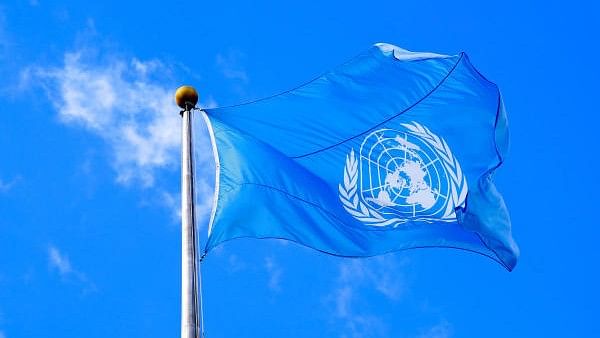
The United Nations flag.
Credit: Reuters Photo
The United Nations has elevated the status of the president of its General Assembly. For the first time in a decade, a former prime minister, who served in that office uninterrupted for 10 years, will preside over the General Assembly when it convenes on September 10 for its 79th annual session. Philemon Yang of Cameroon was elected president by acclamation in line with the timetable of a series of events in the run to the forthcoming session.
Diplomats who have worked in New York for long years as permanent representatives (ambassadors) of their countries have often developed a sense of entitlement to become General Assembly presidents. Four of them have succeeded in this objective since 2014. These were the permanent representatives of Fiji, Hungary, and Nigeria. The incumbent General Assembly president is a former ambassador of Trinidad and Tobago to the UN. When the UN was created after World War II, the post of presiding over the General Assembly from one September to the next was envisioned as a repository of political wisdom combined with diplomatic experience.
India’s Vijaya Lakshmi Pandit, a freedom fighter, and the first woman to preside over the General Assembly in 1953, typified that vision. She had already been ambassador to the Soviet Union, and to the United States when she was elected by the General Assembly to be its president. In addition, she headed the Indian delegation to successive annual sessions of the General Assembly from 1946 until her election as its president. After her term as president ended in 1954, she continued to lead India’s delegation to New York for 13 more years. Such was the soundness of India’s multilateral diplomacy in the early years of its Independence. Such was the sturdiness of the UN in the first two decades of its existence.
As the main representative organ of the UN, there have been efforts in General Assembly meetings in recent years to elevate the position of its president, especially by African members of the UN. In 2014, Sam Kutesa, Uganda’s foreign minister, managed to upstage ambassadors from African Union (AU) countries, who were manipulating to corner the presidency. For two more years in the last decade, Slovakia and Ecuador succeeded in getting their foreign ministers as General Assembly presidents.
In 2021, India got Abdulla Shahid, then foreign minister of The Maldives, elected president as its proxy because New Delhi hoped to push through with determination reforms to the Security Council with his help. The General Assembly president has a critical role in expanding the UNSC. Shahid’s predecessor, Turkish politician Volkan Bozkir, had stopped and pushed back those reforms. Turkey is a friend of Pakistan, a champion of radical Islamic causes globally and is opposed to India’s permanent membership of the UN’s most powerful organ.
At his election, Yang stood out in a sea of Western jackets and ties wearing his nation’s traditional flowing Gandura robe and Chechia hat. His attire was in conformity with the theme of the session that he will call to order in less than a fortnight: “unity in diversity, for the advancement of peace, sustainable development, and human dignity for everyone, everywhere.” None were more pleased than the large number of South Asian women diplomats at the UN, who make a point of dressing in saris. Pakistanis wear salwar kameez. It will be a photo to preserve when Narendra Modi, in his familiar native dress, takes the stand in the General Assembly Hall with Yang in his resplendent robes seated behind the Prime Minister.
In Yang’s mandatory Vision Statement before his election, the president-elect made it a point to mention “the reform of the Security Council (and) the revitalization of the work of the General Assembly. Activities and processes that were initiated by my predecessors will be continued during my presidency,” he assured aspirants to a permanent seat in the UNSC, like India. In his acceptance speech, Yang was more forthright. “The reforms of the Security Council...are often blocked or moving forward slowly, well below the expected results.”
It is now up to the Group of Four (G4) countries — Brazil, Germany, India, and Japan — which have been working together to reform the only body, whose decisions are binding on all UN member states to hold Yang to account on his promise to “increase efforts and stimulate political will, so that we may act more energetically to change this situation.” Together, they must work to ensure that the expansion of the UNSC is included in the draft declaration and other preparations for the 80th anniversary of the UN, which are on the anvil.
K P Nayar has extensively covered West Asia and reported from Washington as a foreign correspondent for 15 years.
(Disclaimer: The views expressed above are the author's own. They do not necessarily reflect the views of DH).